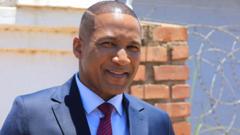In a historic move, President Duma Boko of Botswana is advocating for the legalisation of undocumented Zimbabweans in the country, initiating discussions around temporary work and residence permits to counteract skill shortages and economic challenges.
Botswana's New President Proposes Legalisation of Undocumented Zimbabweans

Botswana's New President Proposes Legalisation of Undocumented Zimbabweans
Duma Boko aims to restart the economy with work permits for undocumented immigrants amidst public opposition.
Botswana, home to the second-largest community of Zimbabweans, has seen a rise in undocumented immigrants fleeing their nation's economic hardships. President Boko emphasized the necessity of formalizing their status to alleviate resentment and encourage their integration into the workforce.
Boko, who recently unseated the long-standing ruling party, recognized that many undocumented Zimbabweans perform essential low-skilled jobs that local citizens often avoid. The government faces daily deportations of undocumented immigrants, primarily from Zimbabwe, which has only fueled tensions.
To tackle this issue, Boko suggested creating a system that not only recognizes the presence of Zimbabweans but also facilitates a skills transfer—allowing Botswana's youth to learn practical trades from them, such as welding and plumbing. He stressed the need to absorb these skilled workers legally, particularly as Botswana aims to enhance its economy in the wake of significant unemployment, presently at around 30%.
In an effort to boost investor confidence, Boko plans to renegotiate Botswana's contract with diamond giant De Beers. A strong diamond revenue stream could potentially aid in his ambitious goal of creating thousands of new jobs each year, which will be crucial to addressing the high unemployment rates.
On the eve of his inauguration, Boko's policies prioritize access to finance and markets for local entrepreneurs, recognizing the potential for job creation through self-employment. As he steps into office, the international community and local citizens alike will be keenly observing how these initiatives unfold in the coming months.
His inauguration is scheduled to take place at the national stadium in Gaborone, with the day declared a public holiday to honor this significant political transition.
Boko, who recently unseated the long-standing ruling party, recognized that many undocumented Zimbabweans perform essential low-skilled jobs that local citizens often avoid. The government faces daily deportations of undocumented immigrants, primarily from Zimbabwe, which has only fueled tensions.
To tackle this issue, Boko suggested creating a system that not only recognizes the presence of Zimbabweans but also facilitates a skills transfer—allowing Botswana's youth to learn practical trades from them, such as welding and plumbing. He stressed the need to absorb these skilled workers legally, particularly as Botswana aims to enhance its economy in the wake of significant unemployment, presently at around 30%.
In an effort to boost investor confidence, Boko plans to renegotiate Botswana's contract with diamond giant De Beers. A strong diamond revenue stream could potentially aid in his ambitious goal of creating thousands of new jobs each year, which will be crucial to addressing the high unemployment rates.
On the eve of his inauguration, Boko's policies prioritize access to finance and markets for local entrepreneurs, recognizing the potential for job creation through self-employment. As he steps into office, the international community and local citizens alike will be keenly observing how these initiatives unfold in the coming months.
His inauguration is scheduled to take place at the national stadium in Gaborone, with the day declared a public holiday to honor this significant political transition.





















